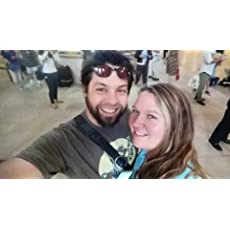JR: Welcome to the blog, Joshua. I thoroughly enjoyed The Chronicles Of Sarco series. It was one I found deep, complex, and one I enjoyed taking my time reading. Not only that, but I found it also brought up an interesting theological concept dealing with possible life on other planets. What inspired this trilogy? Any interesting conversations as a result?
JJ: I grew up as a big-time fan of science fiction, both on TV and in print. I loved Star Trek and I also loved Robert Heinlein and Isaac Asimov. But I also noticed that few of them seriously attempted to grapple with the intersection of faith and science fiction, much less under the assumption that faith could be real. So I decided to dive into a premise that I hadn’t really seen anywhere else. It was a long journey from conception to publication, but it was an amazing experience.
The conversations that have come out of them have been
the best part, especially from my Christian friends who pick up the Easter Eggs throughout the trilogy. I have to admit it’s also a lot of fun to talk about characters that only exist because I thought them up.
JR: COVID-19 has changed a lot of things in our country, not to mention internationally. How has this impacted your writing and your day job?
JJ: It’s affected my life profoundly. My day job is that of a high school teacher, and I’m also a father of two school-
aged kids. All three of us are in virtual school right now, and that means not only coming up with a completely new slate of lesson plans on my end, but also supporting the kids through their schooling. I have been working on a pair of fiction projects – one is in the midst of revisions after feedback, the other is drafted – but both of them are on pause right now while I focus my mental energies on taking care of my family and keeping food on the table.
JR:
You also have written a non-fiction book that I would find useful: An
Unofficial Guide To Shopping At Aldi (now in its second edition).
Anything you'd like to say about this book, and is there a possiblity
of sequels dealing with Kroger's or Wal-Mart?
JJ: That book is the result of a fascinating writing endeavor my wife and I took on. Back in 2016, while I was working on the second Sarco novel, I got the idea to pilot a website devoted to reviews for products for Aldi. I noticed that Aldi sells a lot of niche and random stuff, but I also noticed there weren’t a lot of places online to learn about them. Our blog, with the straightforward name Aldi Reviewer, has since taken on a life of its own, with hundreds of thousands of visitors every month. I decided to supplement it by distilling what we learned into book form. I’d love to write about Kroger or Walmart if I had time. (We did actually visit and blog about Kroger’s Aldi clone, Ruler Foods, for Aldi Reviewer.)
JR: What is the next frontier in your writing? Any way to keep up to date with your intergalactic explorations?
JJ: Like I said earlier, I’m still writing, with two sci-fi writing projects on the burner. One is a land-based science fiction novel with simulation elements (think The Matrix) while the other is a traditional sci-fi adventure in the vein of Homer’s Odyssey. They’re both separate from the Sarco series, although I have this sense that they’re all in the same universe, a little like Brandon Sanderson’s cosmere. Both novels are the first in a planned series, and as the world (and my life) settles down I look forward to getting them to a place where they can see the light of day. Readers can keep up with me over at joshuaajohnston.com.
JR: Thank you for your time, and I hope you have a blessed day.
JJ: Thank you, sir. It was a lot of fun!





















